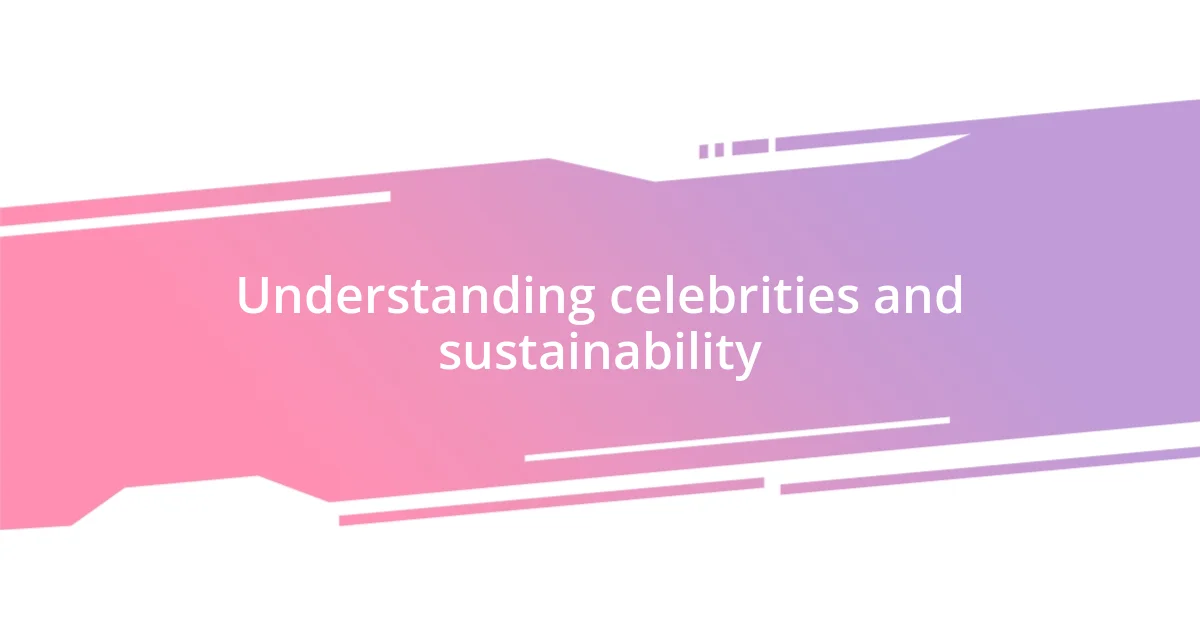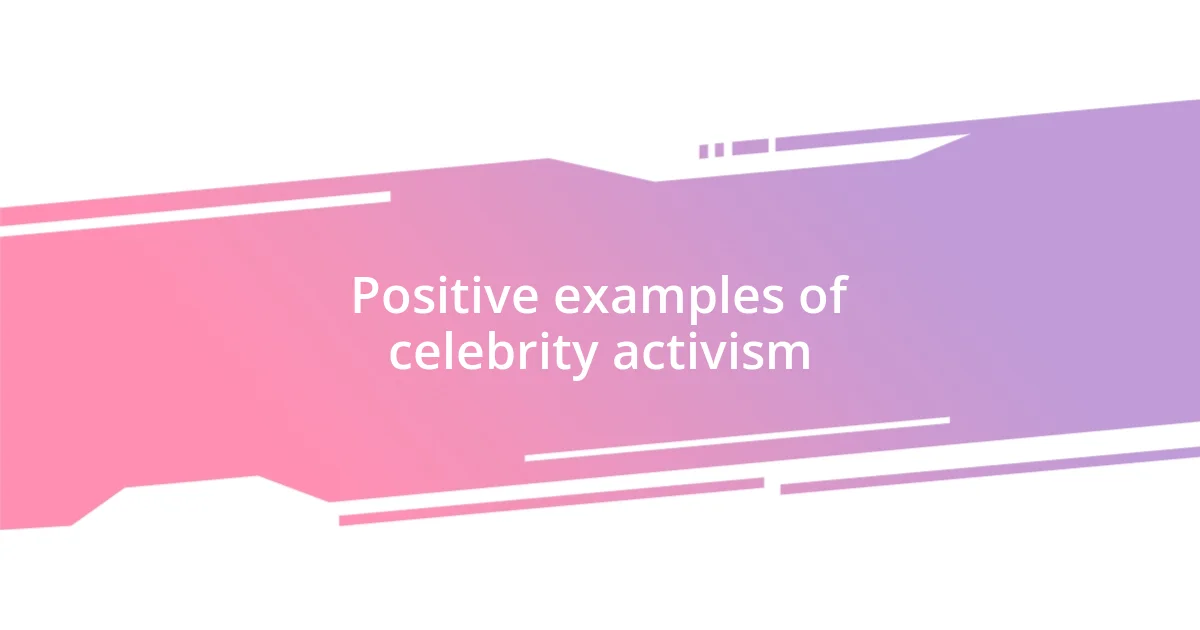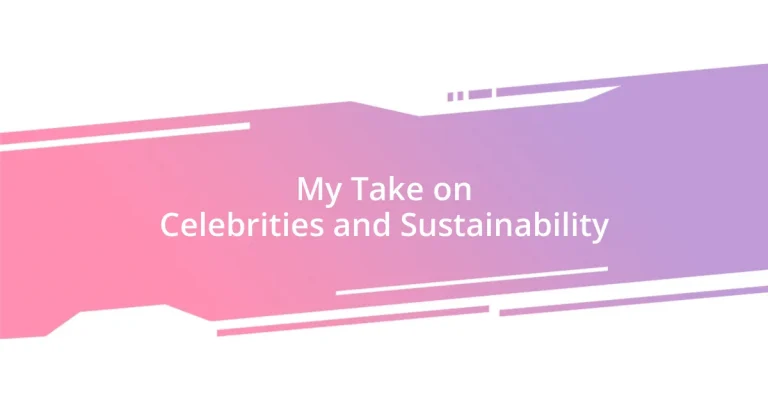Key takeaways:
- Celebrities have significant influence on public discourse around sustainability, leading to both genuine advocacy and concerns about greenwashing and performative activism.
- Positive examples of celebrity activism, such as Emma Watson and Leonardo DiCaprio, illustrate how stars can drive meaningful change and inspire their audiences.
- To foster effective engagement, celebrities should focus on authenticity, collaboration with organizations, and encourage fan participation in sustainability initiatives.

Understanding celebrities and sustainability
When I think about celebrities and sustainability, I’m often struck by how much influence they hold over public opinion. It’s fascinating to witness their ability to shape conversations around environmental issues, don’t you think? For instance, when I saw Leonardo DiCaprio dedicate an entire Oscar speech to climate change, it resonated with me deeply, highlighting how celebrity platforms can drive awareness.
But it’s a double-edged sword. While some celebrities genuinely advocate for sustainability, others may dabble in “greenwashing,” portraying a false commitment to eco-friendliness for publicity. I remember feeling confused when a well-known musician launched a line of eco-friendly products, only to later find out that their production was anything but sustainable. It makes you wonder how genuine some of these efforts really are, right?
Ultimately, understanding this dynamic requires a critical lens. I often ask myself: Are these celebrities truly passionate about sustainability, or are they simply riding the wave of a trend? It’s a personal exploration that can help us discern who to support and which initiatives are worth our attention, keeping us engaged in the broader conversation about the future of our planet.

Positive examples of celebrity activism
Celebrity activism can spark significant change, and I’ve witnessed some incredible actions that make a real difference. For instance, when Pharrell Williams launched the “50 States of Fashion” initiative, his dedication to sustainable fashion inspired many young designers to rethink their practices. It’s moments like these that show how influential stars can be when advocating for meaningful causes.
Here are a few more positive examples of celebrity activism that I admire:
- Emma Watson’s HeForShe Campaign: Actively promoting gender equality and the importance of both men and women in the fight for equality.
- Mark Ruffalo’s Advocacy for the Environment: Passionately pushing for clean water and renewable energy through his organization, the Water Defense.
- Natalie Portman’s Vegan Initiatives: Not only does she promote a plant-based lifestyle, but she also highlights the environmental impact of animal agriculture.
- Leonardo DiCaprio’s Foundation: Financing crucial projects aimed at preserving biodiversity and combating climate change, furthering his commitment showcased in his Oscar speech.
Seeing these efforts, I often feel a swell of hope. It’s refreshing to observe celebrities using their platforms for positive change rather than simply pursuing fame or profit. Each of these activists brings their unique passion to the table, encouraging their fans and followers to think more critically about the world around them.

Criticisms of celebrity engagement
While celebrity engagement in sustainability can inspire many, it also draws significant criticism. I’ve noticed that the sheer visibility of these stars can sometimes overshadow the complexities of environmental issues. For example, it feels frustrating when a celebrity endorses a product marketed as “green” without any genuine knowledge of its environmental impact. This disconnect can create a false sense of security for fans, who may believe these products are unquestionably good for the planet.
Moreover, the concept of “performative activism” often comes to mind when I think about celebrity involvement. I remember reading an article about a high-profile star who posted several eco-friendly messages online but later was found fueling excessive private jet travel, which ironically contributed more pollution than their social media posts could counteract. This raises questions about the effectiveness of celebrity advocacy — are they merely creating noise, or is there meaningful action behind the scenes?
Finally, I wonder about the responsibility celebrities have when they engage in sustainability conversations. They wield substantial influence, yet their actions can sometimes come off as disingenuous. It leaves me feeling conflicted when I encounter initiatives promoted by my favorite stars that seem to focus more on image enhancement than actual change. I suppose what would help is greater transparency — for me, a simple verification of claims can go a long way in establishing trust between celebrities and their audience.
| Issues | Examples |
|---|---|
| Greenwashing | Celebrity endorsing “eco-friendly” products with poor sustainability practices. |
| Performative Activism | Promoting environmental causes publicly while engaging in harmful practices privately. |
| Lack of Transparency | Celebrities allowing their influence to obscure the reality of their environmental impact. |

Practical steps for celebrity influence
To maximize their influence, celebrities can take practical steps that go beyond mere endorsements. For instance, I often think about the power of collaborative platforms. When a star partners with environmental organizations, they not only amplify their message but also lend credibility to the cause. I felt a sense of empowerment when I saw one of my favorite artists team up with a local nonprofit for a fundraising event. It demonstrated how impactful, genuine collaborations can be.
Additionally, celebrities can leverage social media to engage their followers in meaningful ways. Instead of just posting glamorous photos, imagine the ripple effect if they shared educational content about sustainability practices. When I stumbled upon a live Q&A session where a celebrity discussed composting tips, I was not only inspired but also learned practical ways to reduce waste at home. Wouldn’t it be amazing if more stars embraced this format, turning their feeds into platforms for real dialogue?
Lastly, I believe that authenticity plays a crucial role in sustainable celebrity activism. When celebrities share their personal journeys — the challenges they face in implementing sustainable choices — it makes their efforts feel relatable. I remember feeling a connection when a well-known actor opened up about their struggles with balancing eco-friendly habits and their busy lifestyle. It made me reflect on my journey and the small steps I needed to take. This vulnerability can draw fans closer and foster a community of shared learning and growth.

Building sustainable brands with celebrities
Building a sustainable brand with a celebrity at its helm can be a game-changer. When I think about this, I’ve often seen how a celebrity’s alignment with eco-friendly values can immediately lend a brand credibility. For instance, I recall an instance when a popular actress launched a sustainable fashion line. The buzz around it was palpable, and it really made me reconsider the brands I typically purchase from. It’s fascinating how just one person can shift perceptions and behaviors.
Moreover, the stories behind these collaborations can create powerful narratives that resonate with consumers. I remember watching a documentary about a well-known musician who dedicated a portion of the proceeds from their album to ocean clean-up efforts. His passion shone through, and it inspired me to delve deeper into the environmental battles we face. Isn’t it incredible how sharing personal passions can turn into significant movements?
What strikes me the most is the responsibility that comes with this kind of influence. As I see various celebrities claiming to champion sustainability, I can’t help but wonder—are they also educating themselves on the issues at hand? I once saw a video of a celebrity discussing their commitment to reducing plastic use, but I couldn’t shake the feeling they were overselling their impact. This makes me think about the importance of continuous learning and openness in this arena—only then can they genuinely contribute to meaningful change.

Encouraging fan participation in sustainability
Involving fans in sustainability efforts can transform mere interest into genuine action. I remember the thrill I felt when a favorite celebrity organized a community clean-up day and invited fans to join. It wasn’t just about celebrity presence; it was the collective energy that motivated many of us to tidy up our local parks. Have you ever participated in an event like this? The sense of community can be surprisingly uplifting.
Moreover, challenges can be a fun way to engage fans. I once participated in a sustainability challenge hosted by an influencer, where we documented our efforts to reduce waste for a month. Seeing others share their progress on social media created a ripple effect and encouraged me to step up my game. What if celebrities initiated monthly challenges to promote habits like zero waste or carpooling? The impact could be profound if we all rallied together.
Ultimately, when celebrities share not just wins but also setbacks, it empowers fans to join in with honesty. I recall a well-known singer discussing their difficulties in maintaining a fully vegan diet while traveling. It resonated with me because I sometimes struggle too. This transparency could lead to more open dialogues about living sustainably, inspiring fans to take their own steps without the pressure of perfection. What do you think; can vulnerability drive more meaningful engagement in sustainability?














